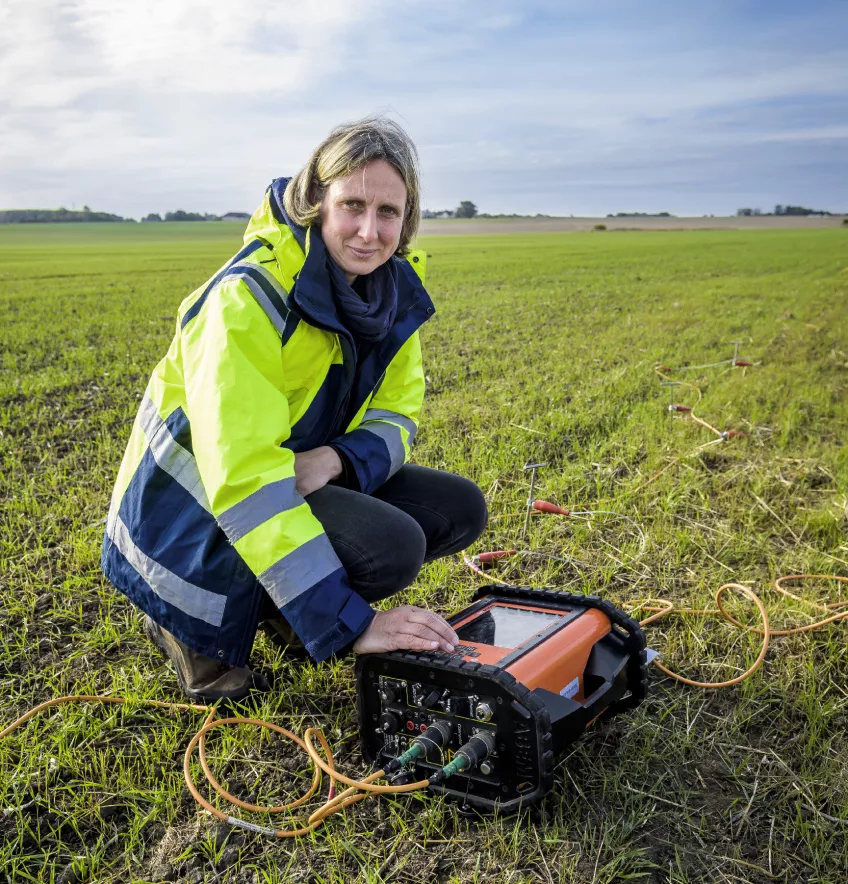Blue Transition measures are urgent for meeting future water needs
The water of the North Sea region is not only affected by climate change, but also by people’s use of water and land in the surroundings. In order to have continued future access to clean water – and a sufficient supply – measures need to be taken immediately. This is shown by the EU project, Blue Transition, in which Lund University participates and contributes to strategies for the future through research on Vombsjön and Bolmen – lakes that are crucial for the future supply of water in Skåne.
Jessika Sellergren – Published 25 October 2023

Blue Transition is an Interreg North Sea project that will receive EUR 4.3 million in funding from the EU until 2026. The project is led by the Leibniz Institute for Applied Geophysics in Germany. Lund University, which is one of 23 project partners, receives around SEK 6 million plus SEK 3.3 million in co-funding from Sweden Water Research.
Focus on Vombsjön and Bolmen
The research at Lund University focuses on Vombsjön and Bolmen, lakes that are pilot areas in the project. Tina Martin, researcher in Engineering Geology at the Faculty of Engineering (LTH) and project manager of Lund University’s area of responsibility within Blue Transition, explains why the lakes are important:
“Increasingly frequent extreme weather, combined with a growing population and expanding industrial and agricultural activities, make it particularly urgent to secure access to clean water from Vombsjön and Bolmen. The lakes are crucial for ensuring the supply of drinking water in Skåne.”
The lakes’ issues differ
Bolmen contends with brownification, which means that the lake water gets a brown colouration from iron and organic material. An increasingly brown lake causes changes in the ecosystem and can impair the drinking water.
The Vomb basin is an important groundwater reservoir in southern Sweden. The basin’s younger rock layers consist of a porous sandy limestone, which together with almost 80 metres of quaternary deposits makes it one of the largest aquifers in southern Sweden, explains Tina Martin.
“If we take more and more water from the Vomb basin at the same time as the climate is changing, the sensitive ecosystem and biological diversity in the area will be impacted. It is therefore very important that the method for collecting water is improved, so that the surrounding environment is affected as little as possible,” she says.
The Vomb basin also includes Storkriket, which consists of the protected natural areas Klingavälsån and Vombs Ängar.
“Work is being conducted to make Storkriket a biosphere reserve within UNESCO, so that the area can be used to develop new methods for water management – and be better protected,” says Tina Martin.
International consensus for future water management
Research at Bolmen and Vombsjön has been going on for several years, but coordination of the research within Blue Transition is something new since the project started last year. One of the goals of the project is an international consensus with knowledge that is to be of direct use for public authorities, industry, agriculture and society in general.
The research area in Southern Sweden is one of 16 pilot areas in the study. The others are in Belgium, Denmark, France, the Netherlands and Germany. The areas are studied using ground surveys of various types and through the analysis of the land’s underground structures using drone technology. The aim is to establish common processes for the use of ground water and the management of wetlands, peatlands, nature reserves, forests, and agricultural and urban areas.
“Coordination is important to protect the natural habitats, help to reduce carbon dioxide emissions and ensure that we have access to clean water in the future,” says Tina Martin.

Lund University researchers involved in the project
Tina Martin
Researcher in Engineering Geology at the Faculty of Engineering (LTH), Lund University
Tina Martin in Lund University Research Portal
Clemens Klante
Research leader at the Bolmen Research Station, Sydvatten. Earned a doctoral degree in Water Resources Engineering at LTH
Clemens Klante in Lund University Research Portal
Blue Transition
Blue Transition has total funding of EUR 7.1 million. The project, which runs until 2026, is known as an Interreg project, which focuses on developing cooperation across national boundaries with an aim to encourage regions from different countries to work together and learn from each other with joint programmes, projects and networks. Lund University receives SEK 6 million from the EU budget and co-funding from Sweden Water Research. Lund University collaborates with the Geology Survey of Sweden and Sydvatten on the project.
Reducing browning of lake water
Tina Martin was also the project manager of the FORMAS-funded project Reducing Browning of Lake Water, which ended recently. The project is closely connected with the work within Blue Transition.
Read more about the research in the news item: Many reasons to take care of lake water | Lund University
